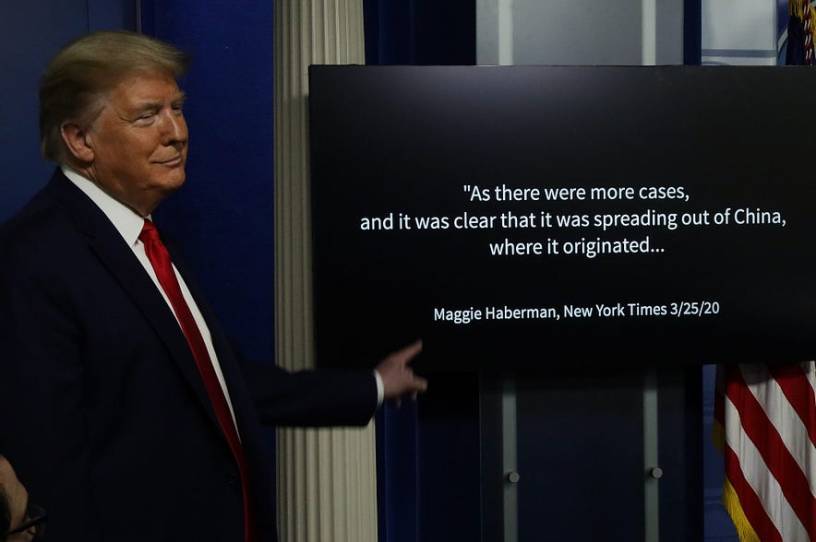Did the Media ‘Minimize the Risk’ of Coronavirus Early On?

During his daily coronavirus task force press briefing Monday, President Trump played a video intended to highlight his administration’s success in combating the virus. The video was split into three parts: The first focused on how “[t]he media minimized the risk from the start”; the second offered a timeline of actions taken by the federal government; and the third was a compilation of governors from both political parties praising Trump and his team for their work with the state governments.
Let’s look at the claims that the media “minimized the risk from the start” and put them into context of what was known.
Four news clips played showing various media figures downplaying the threat of coronavirus from January 25 to February 8. The first two, from January 25, featured ABC’s andNBC’s medical correspondents, Dr. Jennifer Ashton and Dr. John Torres, respectively, saying coronavirus wasn’t yet at the level of threat to the U.S. as the flu. At the time of their comments, the CDC reported 15 million flu cases in the United States and 8,200 deaths, with only two coronavirus cases and zero coronavirus deaths.
A clip from January 27 showed Dr. Anthony Fauci on Fox News being questioned by Sean Hannity about the possibility of coronavirus being worse than anticipated. Fauci did not speak during the clip included in the video. Elsewhere in the interview, however, Dr. Fauci stated that “It’s a low risk, but the situation in China is very, very mobile in the sense that it’s evolving. It’s not a static situation. So it could get much worse.”
The fourth clip showed Dr. David Agus, professor of medicine and engineering at the University of Southern California, on CBS This Morning on February 8, claiming that “coronavirus is not going to cause a major issue in the United States.”
All but the last of these clips occurred before the World Health Organization declared a public health emergency on January 30 and at a time when a CDC representative stated that “the virus is not spreading in the community. For that reason we continue to believe that the immediate health risk from the new virus to the general public is low at this time.”
It’s worth noting, too, that the press is not a monolith. While some articles and news segments didn’t raise alarm about the virus, many did. The New York Times, for example, ran a piece by the director of the Yale Institute for Global Health, Dr. Saad Omer, who warned on January 23: “We are once again faced with the outbreak of an emerging pathogen with potentially global implications. We don’t know how bad it will get. But there is no excuse for not getting ready for the worst.”
On January 22, an article published by the Washington Post read: “it is already too late to avoid multiple cases of the dangerous new coronavirus in the United States. We are past the ‘if’ question and squarely facing the ‘how bad will it be’ phase of the response.”
CNN responded to the president’s accusation of minimization by compiling their early coverage to provide additional context:
As Fauci noted during an interview with MSNBC on Sunday, the misinformation spread by China during the early stages of the pandemic led the health professionals community to believe coronavirus posed less of a threat than it actually did. It wasn’t until January 28 that human-to-human transmission of the virus was reported outside of China. The same day, the head of the CDC, Dr. Robert Redfield said: “The immediate health risk of this new virus to the general public is low in our nation.” The CDC didn’t confirm the first case of community transmission in the United States until January 30. And as Peter Kafka pointed out in an article for Vox, “when it came to grappling with a new disease they knew nothing about, journalists most often turned to experts and institutions for information, and relayed what those experts and institutions told them to their audience.” Once the experts began to treat coronavirus more seriously, the media—or at least those who hadn’t already—did as well.
During a February 5 segment on ABC News, Dr. Ashton told audiences: “This is a global health crisis right now and we don’t know what it will bring.” On February 6, NBC broadcast a video in which Dr. Torres explained what precautions to take to avoid catching coronavirus. By the end of the month, CBS’s Dr. Agus encouraged Americans to “plan as if a big storm was coming” for coronavirus quarantine.
By contrast, President Trump on February 28 complained “the press is in hysteria mode” over coronavirus. And as noted in a previous fact check, although he imposed some restrictions on travel from China in late January, President Trump publicly insisted coronavirus was not a serious threat to the United States until early March. Trump declared a national emergency to deal with coronavirus on March 13.
If you have a claim you would like to see us fact check, please send us an email at factcheck@thedispatch.com. If you would like to suggest a correction to this piece or any other Dispatch article, please email corrections@thedispatch.com.
Photograph by Alex Wong/Getty Images.